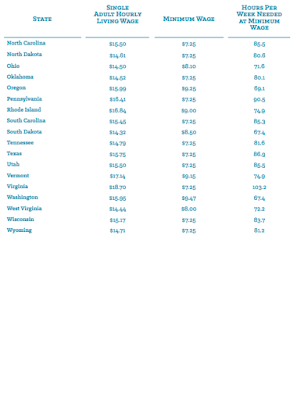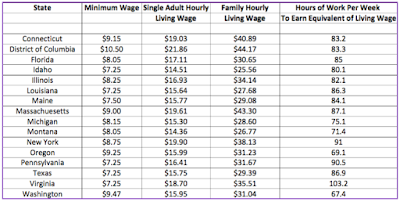A recent publication by the Alliance for a Just Society entitled "Pay Up" looks at how difficult it is for many working families In the United States to move beyond the "paycheck to paycheck" scenario that is particularly common among lower and even middle income families. America's recent discussions about moving toward a $15 per hour minimum wage is seen as a solution to the problem, however, this study looks at whether $15 per hour is enough to ensure financial stability for millions of American families, in other words, is $15 really a living wage and how does that living wage vary from state-to-state? Here are some key points from this year's edition.
Let's start by looking at a definition of a "living wage". A living wage is defined as a wage that "…allows families to meet their basic needs, without public assistance, and that provides them some ability to deal with emergencies and plan ahead." Obviously, the cost of meeting basic needs like housing, food and other services like transportation varies widely from state to state. On a national basis, Alliance for a Just Society has calculated that the living wage for a single adult is $16.87 per hour and that at the current minimum wage of $7.25 an hour, a person would have to work 93.1 hours per week just to make the national single adult hourly living wage of $16.87 for a 40 hour work week. To help put this number into perspective, in 2014, there were 4,562,160 Americans working as retail salespersons earning a median wage of $10.29 per hour, well below the national living wage.
On a state-by-state level, the living wage varies greatly as you can see on this table for single adults:
The lowest living wage for a single adult is $14.26 per hour in Arkansas and the highest is $21.44 in Hawaii. If we stick to the continental United States, the highest living wage is $21.86 in the District of Columbia.
Here is a table showing how many hours of work it takes a single worker, earning at the current state minimum wage level, to earn the equivalent of a living wage required in their home state for a 40 hour work week:
In the best case scenario, a minimum wage earner in Washington (earning $9.47 per hour) would have to work 67.4 hours per week to make the equivalent of a living wage of $15.95 per hour needed to meet their basic needs. In the worst case scenario, a minimum wage earner in Virginia (earning $7.25 per hour) would have to work a whopping 103.2 hours per week to make the equivalent of a living wage of $18.70 per hour needed to meet their basic needs.
The situation looks much worse for a family scenario. For instance, the living wage for a single adult in California is $19.39 per hour. This rises to a living wage of $39.59 per hour for a single adult with two children. At the current California minimum wage of $9.00 per hour, this adult would have to work 86.2 hours per week to reach the living wage level.
Here is a table showing the current minimum wage, the single adult hourly living wage, the family hourly living wage (single adult with two children) and the number of hours that a single adult would have to work to support a family of three to earn the equivalent of a living wage for a selection of states:
While the $15 per hour minimum wage has been held up as the "gold standard", this study shows that, depending on one's state of residence, $15 per hour may not be a living wage. This means that even if the federally mandated minimum wage is raised to the "gold standard", families in states that have higher costs of living may find themselves still having difficulty making ends meet and providing for their loved ones.
Click HERE to read more of Glen Asher's columns
You can publish this article on your website as long as you provide a link back to this page.





Be the first to comment